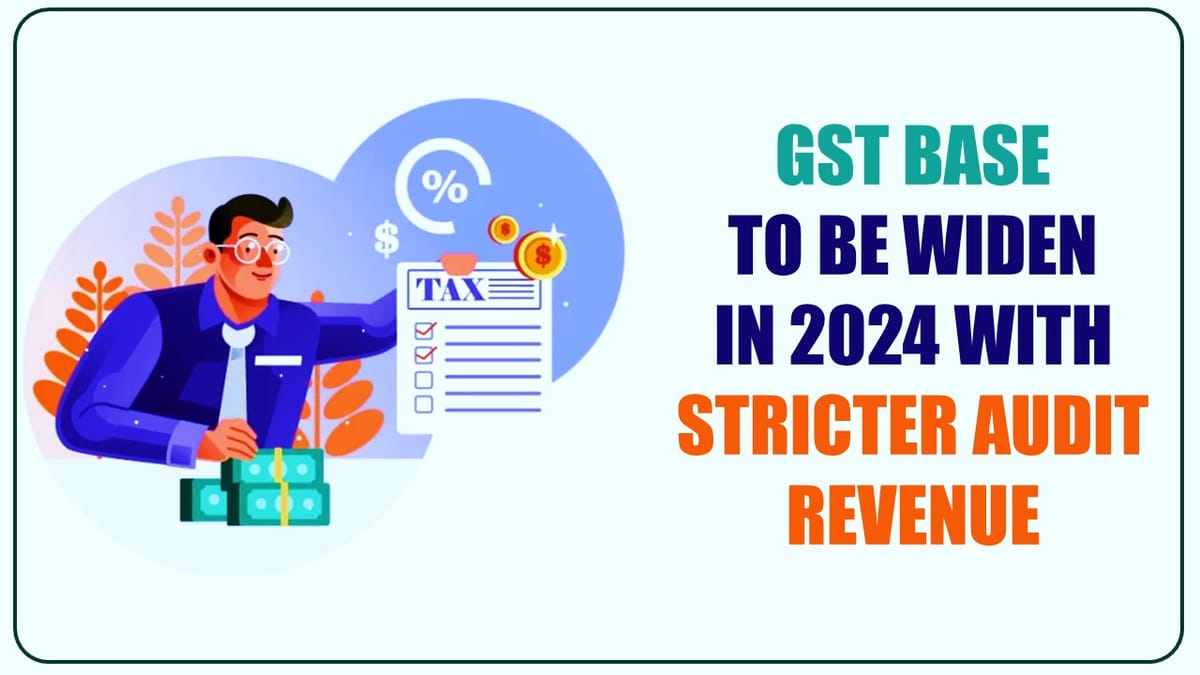Priyanka Kumari | Dec 26, 2023 |

GST Base to be widen in 2024; Strict Audit boost revenue
Finance Minister Nirmala Sitharaman stated earlier this year that the GST (goods and services tax) regime has improved the system significantly, benefiting not only the states but eventually the “people as well.”
Anyone could claim that the present weighted average GST tax rate, which is less than the revenue-neutral rate of 15%, has resulted in fewer tax collections, largely harming state tax revenues.
However, persistent buoyancy in the GST mop-up, along with an expanding tax base and lower compliance costs, has boosted both centre and state revenue collections and offered a cushion against financial slippage, which experts predict will continue to some extent in the year ahead.
A revision of GST slabs with the goal of simplification is likely once a new government takes office following the Lok Sabha elections. Analysts argue that the recast should focus on broadening the tax base and increasing tax credit flows rather than wholesale rate hikes that could harm consumption. During the evaluation, the list of tax-free items may be reduced.
Gross GST collections increased by 12% year on year in the first eight months of the current financial year, with a monthly average mop-up of Rs 1.66 trillion. Monthly average receipts in the financial year 2023 were Rs 1.50 trillion, compared to Rs 1.24 trillion in the financial year 2022.
Among the components of gross collections, Central Goods and Services Tax (CGST) collections increased by 16.7% in the April-November Financial Year 2024, while State GST (SGST) collections increased by 15.4%.
IGST collections, on the other hand, have increased at an average rate of 8.6%, as they include collections from imports of goods, which have increased at a far slower rate of 2.6% year on year. Cess collections increased by 12.9% between April and November.
Even though cess collections are included in the gross GST mop-up and are recorded as revenue receipts in the Consolidated Fund of India. It is collected solely to compensate states for revenue lost as a result of the implementation of the GST regime.
It was meant to be imposed until June 2022, but the Center stretched it until March 2026. Due to the pandemic, compensation cess collections were insufficient to cover governmental compensation payments. To close the gap, the centre borrowed approximately Rs 2.7 trillion in financial years 2021 and 2022. The revenue collected from the compensation cess from July 2022 to March 2026 will be used to repay borrowings.
Even when cess collections are excluded from the overall GST mop-up, the collection growth rate is comparable to that of gross GST collections. In other words, removing the compensatory cess would not affect the GST mop-up’s growth trajectory.
Insipid collections from goods imports are a direct result of a decrease in merchandise imports. Between April and November, merchandise imports fell 8.7% year on year. Experts attribute the increase in tax collections to economic development and increased compliance.
GST collections have increased considerably from Rs. 80,000 crore to Rs. 1.2 trillion in the early years of the regime to an average monthly collection of Rs. 1.7 trillion in the latest financial year, owing to increased domestic consumption, government initiatives to improve tax compliance and plug tax leakages, e-invoicing requirements, and an increase in purchasing power.
The finance ministry stated in a post on ‘X’ last week that the overall number of GST returns filed has increased 56% to 11.28 million between April 2018 and April 2023, owing to improvements in taxpayer compliance driven by “effective policy” and “systemic changes” in GST.
During the same period, the number of active GST taxpayers increased by 33% to 13.96 million.
Recently, Minister of State for Finance Pankaj Chaudhary stated that the government has taken several steps to improve tax compliance over the years, including mandating e-way bill-ITC matching, mandating e-invoice, deploying AI and ML-based analytics, aadhaar authentication for registration, calibrating action on non-filers, and integrating e-way bill with fast tag.
Furthermore, the present financial year has seen an increase in audits on various industries, both as a government strategy and due to the deadline to issue demand notices for the two financial years 2017-18 and 2018-19. “The increase in audits and scrutiny has resulted in increased compliance, leading to an increase in GST payments.”
In addition, there has been a severe crackdown on GST evaders, particularly on bogus billing. This has also been added to the collection.
The Directorate General of GST Intelligence (DGGI) has detected Rs. 1.36 trillion in overall GST evasion, including false input tax credit (ITC), till October of the current financial year. A total of Rs. 14,108 crore has been recovered. To catch tax evaders, authorities use system-based analytical tools and red-flag reports issued by the system.
The pace of GST collections in the coming year will be influenced by decreasing nominal GDP growth, which is likely to decrease due to external uncertainty and sluggish domestic demand conditions, primarily in rural areas. However, the consequences may not be proportional because the growth in GST receipts so far this year has outpaced the 10.5% nominal GDP growth predicted in the budget.
A 10-12% increase appears sustainable, given that the increase in compliance management and audits is likely to continue next year. An increase in certain rates, such as online gaming, will have an impact on the collection’s continued growth.
Another issue that may have an impact on GST collections is the GST rate rationalisation, which has been under review by the GST Council’s Group of Ministers for some time.
In case of any Doubt regarding Membership you can mail us at [email protected]
Join Studycafe's WhatsApp Group or Telegram Channel for Latest Updates on Government Job, Sarkari Naukri, Private Jobs, Income Tax, GST, Companies Act, Judgements and CA, CS, ICWA, and MUCH MORE!"